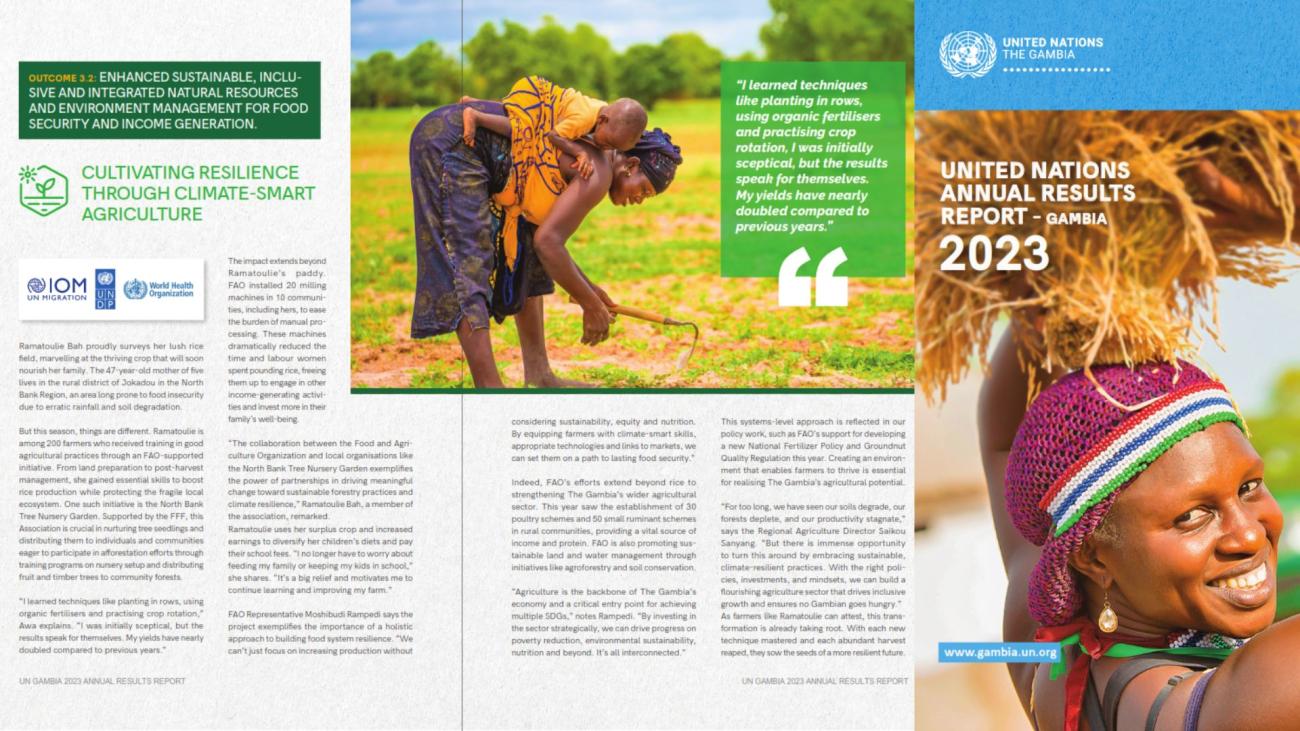Ramotaule Bah proudly surveys her lush rice field, marveling at the thriving crop that will soon nourish her family. The 47-year-old mother of five lives in the rural district of Jokadou in the North Bank Region, an area long prone to food insecurity due to erratic rainfall and soil degradation.
But this season, things are different. Ramotaule is among 200 farmers who received training in agroecological practices through an FAO-supported initiative. From land preparation to post-harvest management, she gained essential skills to boost rice production while safeguarding the fragile local ecosystem. One such initiative, the North Bank Tree Nursery Garden, supported by FAO, the Farmers’ Association is crucial in nurturing tree seedlings and distributing them to farmers to ensure the successful replanting of native trees. This approach promotes soil fertility and combats erosion, ultimately contributing to more sustainable and resilient food systems.
“I learned techniques like planting in rows, using organic fertilizers and practicing crop rotation,” Ramotaule explains. “I was initially skeptical, but the results speak for themselves. My yields have nearly doubled compared to previous years.”
The impact extends beyond Ramotaule’s paddy. FAO installed 20 milling machines in 10 communities, including hers, to ease the burden of manual processing. These machines dramatically reduce the time and labour required for paddy processing, enabling farmers to engage in other economic activities and thereby improving their families' well-being.
“The collaboration between the Food and Agriculture Organization and local organizations like the North Bank Tree Nursery Garden exemplifies the impact of partnerships in driving meaningful change. By adopting restorative practices and new technologies,” Ramotaule Bah, a member of the Farmers’ Association, reflects on the positive outcomes. Ramotaule credits her surplus crop and increased earnings for helping her child stay in school,” she adds. “I no longer have to worry about feeding my family or being able to afford my children’s school fees. Now I can even think of saving money to invest back into my farm.”
FAO Representative Moshibudi Rampedi says the project exemplifies the importance of a holistic approach to fostering food resilience.
“We can’t focus on increasing production without considering sustainability, equity and nutrition. By equipping farmers with climate-smart skills, appropriate technologies and links to markets, we can set them on a path to lasting food security.”
Indeed, FAO’s efforts extend beyond rice to strengthening The Gambia’s wider agricultural sector. This year, with the establishment of 30 new orchards and 50 small ruminant schemes in rural communities, providing a vital source of nutrition and income. FAO is also promoting sustainable land and water management through initiatives like agroforestry and soil conservation.
“Agriculture is the backbone of The Gambia’s economy and a critical entry point for achieving multiple SDGs,” notes Rampedi. “By investing in the sector strategically, we can drive progress on poverty reduction, environmental sustainability, nutrition and beyond. It’s all interconnected.”
This systems-level approach is reflected in our policy work, such as FAO’s support for developing a new National Fertilizer Policy and Groundnut Quality Regulation this year. Creating an environment that enables farmers to thrive is essential for realizing The Gambia’s agricultural potential.
“For too long, we have seen our soils degrade, our forests deplete, and our productivity stagnate,” says the Regional Agriculture Director Saikou Sanyang. “There’s an immense opportunity to turn this around by embracing sustainable, climate-resilient practices. With the right policies and investments, we can build a flourishing agriculture sector that drives inclusive growth and ensures no Gambian goes hungry.” As farmers like Ramotaule can attest, this transformation is already taking root. With each new seedling planted and each abundant harvest reaped, they sow the seeds of a more resilient future.






